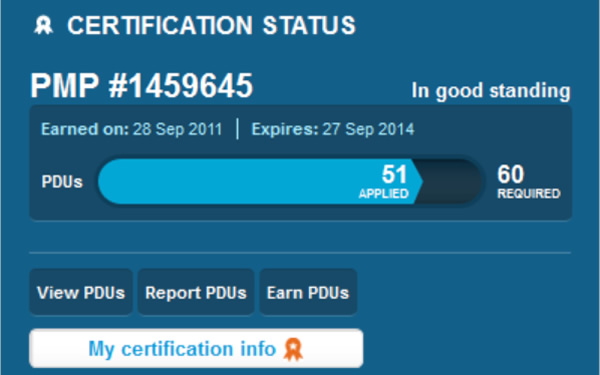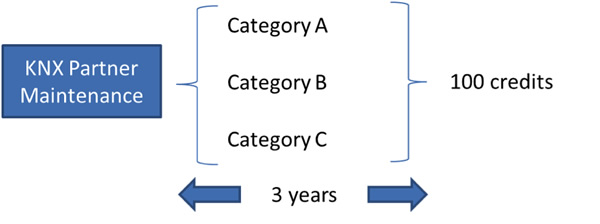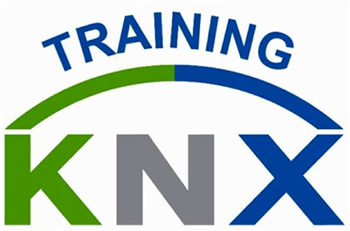 By Jesús Arias García, KNXin.
By Jesús Arias García, KNXin.
As part of my email sign off, I display the two certifications of which I am proudest:
• KNX Partner (KONNEX Partner).
• PMP (Project Management Professional).
Both require a reasonable amount of effort and commitment to attain, and both are very well considered amongst professionals in their respective fields. In addition, both are based on standards approved by the ISO. But there is a very noticeable difference between them, namely what is involved in maintaining the certification.
While the KNX Partner certification process is something you go through once in your life and you retain forever, PMP must be re-certified every three years, under what the PMI (Project Management Institute) calls the CCR (Continuing Certification Requirements). This means that every three years, I have to prove that I have completed 60 PDUs (Professional Development Units).

As you can see from my certification status above, I still need nine more credits before the 27th of September. If you do not get the 60 credits required, you are placed into a ‘penitence process’ for one year, in which time your certification is actually suspended but you still have the opportunity to acquire the missing credits. If you do not acquire them, you lose your certification. It is as simple as that.
Dispelling the Myths around Certification Maintenance
One of the typical complaints against certification maintenance is that it is purely a money-making exercise for the body involved. I counter that with the fact that to date, I have not spent a single cent on getting my credits. Of course there are options that cost money – for example, I am considering attending a training that will give me the missing credits, and I will have to pay for it, but I will do it because I am interested in the course and it is something that will have a positive impact on my business.
If you are wondering how I got my credits, the following are examples of what I have done since September 2011:
• Delivered trainings to system integrators about project management.
• Written about project management.
• Attended online webinars on the International Day of Project Management.
• Read books about project management.
• Worked as a practitioner.
None of this cost me money – in fact I actually make money on the training – and I could claim credits back. There is no point in trying to cheat because there are random audits which demand that you send proof of all of your activities.
Another objection is that although you may have sufficient credits, it does not necessarily mean that your skills have been updated. That is true, but if there is no certification maintenance at all, there will be people out there who have done no personal development whatsoever for some time, perhaps even years, yet they have the same certification as you. Is that fair?
The maintenance process forces you to look for alternatives to get your credits, but these are easily found. With all of the thousands of people involved in certification, there is a lot of content being published, and many active seminars, forums, etc. The market is awash with information and full of options related to training.
The last main objection is that certification maintenance is considered a hassle for professionals, as they have enough to do already. I agree, we are all busy people, but believe me, if you are active in this market, maintaining your credits would be simple enough. It would be a part of your everyday activities and require very little extra effort.
Could Certification Maintenance Work for KNX Partners?
What if we took KNX Partner certification to the next level, and had a scheme similar to the one mentioned above? Please don’t be alarmed, this is just an idea that I’m putting out there. I think that the impact would be positive, for the following reasons:
1) The real number of KNX Partners.
During the Light+Building 2014 show, I was talking to a KNX Member involved in sales, and he was complaining that it is difficult to structure campaigns around KNX Partners due to outdated data and the uncertainty of which KNX Partners are currently active.
Furthermore, there will come a time when the growth in KNX Partners per year decreases, and that is a fact. In both instances, what would be really useful to know is who was actually active in the market. If 15% of KNX Partners did not bother to maintain their certification for example, we would have a much better idea.

2) Feedback from the market.
Wouldn’t it be great if KNX projects could be registered somewhere, creating a huge database of projects taking place in different markets, which systems were involved, the number of devices used in the project, and other useful statistics? And how could you encourage KNX Partners to register their projects and provide the detail required? Give them credits towards their certification maintenance of course – a win-win situation.
3) More business opportunities.
Once you get your KNX Advance certification, there is not much else you can do. KNX training centres are perfectly capable of delivering a more varied choice of training, and they should do so. Trainings sponsored by specific manufacturers are good, but they are of course focused on the sponsor’s products are do not give an appreciation of the whole picture, whereas very specific, short trainings would provide KNX Partners with powerful tools to reach other markets and get to know about more brand-independent solutions.

Ideas for Credits
There could be many ways of getting credits from activities related to our profession. The following are some ideas:
• Attending national seminars.
• Registering at the KNX City at Light+Building.
• Being involved with national groups.
• Creating content related to KNX.
• Working as a practitioner.
• Registering KNX projects.
• Doing specific training.
• Reading books.
Conclusion
I believe that a KNX Partner certification maintenance programme could offer significant advantages to the industry as a whole. It would keep KNX Partners engaged and up-to-date and help them to develop their skills and businesses. It would ensure a dynamic relationship between all interested parties, encourage people to give back to the community, and give the qualification even more professional weight.
Introducing KNX Partner certification maintenance is perhaps a controversial suggestion, but it is worth discussing if it generates new ideas that will benefit us all.
Jesús Arias García is a freelance Engineering Consultant for KNXin, a consultant engineering firm specialising in KNX technology and green buildings. His co-authored book ‘KNX for LEED‘ is available through the KNX Online Shop.
You are welcome to comment on this article. See below.












